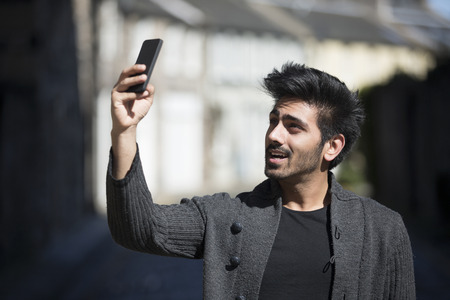Posting too many selfies (selfitis) a mental disorder? Researchers weigh in

Image: INQUIRER.net Stock Photo
Two researchers tried to confirm if there was any truth to selfitis, a 2014 hoax that labeled the obsessive taking of selfies as a mental disorder.
Janarthanan Balakrishnan of the Thiagarajar School of Management in India and Mark D. Griffiths of Nottingham Trent University developed a Selfitis Behavior Scale based on the levels of selfie obsession put forward by the hoax, namely borderline, acute and chronic.
Article continues after this advertisementTheir findings were published in the International Journal of Mental Health and Addiction.
The article, published in the Filipino satire website The Adobo Chronicles, described the levels of selfitis as follows: borderline is taking photos of one’s self at least three times a day but not posting them on social media, acute means taking photos of one’s self at least three times a day and posting each of the photos on social media, and chronic is the uncontrollable urge to take photos of one’s self round the clock and posting the photos on social media more than six times a day.
The researchers tapped 225 Indian students for focus group interviews to help develop the Selfitis Behavior Scale and to identify factors behind the “disorder.”
Article continues after this advertisementSix components of selfitis were identified, namely environmental enhancement, social competition, attention seeking, mood modification, self-confidence and social conformity.
Subjective conformity (gaining acceptance within a peer group) had the highest mean score on “acute” selfitis.
Attention seeking, environmental enhancement and social competition had the highest mean scores in the “chronic” condition.
Environmental enhancement was related to “better enjoying” the environment and “providing better memories” of an occasion. Attention seeking referred to “feeling more popular” and “expecting appraisal” from friends. Social competition included “increasing social status.”
Skepticism on selfie study
While the study took for granted that selfitis was real based on the definitions of a satirical article, other experts have weighed in and have firmly said that “selfitis” simply isn’t real.
According to the Telegram, Dr. Mark Salter, a spokesman for The Royal College of Psychiatrists, said, “Selfitis doesn’t exist, and it shouldn’t exist.”
“There is a tendency to try and label a whole range of complicated and complex human behaviors with a single word,” he explained.
“But that is dangerous because it can give something reality where it really has none.”
Psychotherapist Amy Morin told Business Insider, “Almost anything has the potential to become an addiction.”
Taking too many selfies should become a concern if it interferes with daily functions like “missing out on face-to-face interactions with friends,” being “late for work” or even being unable to study “because you’re preoccupied with looking at how many likes your latest selfie got.”
If you have friends taking too many selfies, there might not be too much cause for concern. But perhaps for your own peace of mind, there’s Facebook’s new Snooze feature to temporarily mute their posts from flooding your feed. /ra
RELATED STORIES
Facebook: Using social media can make you feel bad
Selfie addicts overestimate how attractive they are—study
‘Snooze’ feature on FB lets users temporarily hide people, pages